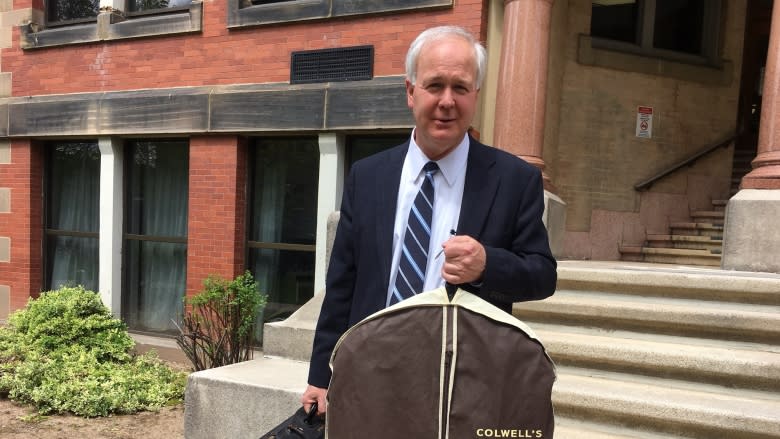MLA's lawyers ask for dismissal of Windsor Energy defamation suit
Lawyers for a Progressive Conservative MLA have asked New Brunswick's highest court to throw out a defamation lawsuit filed against him by a shale gas company.
The request stems from a 2011 incident when Bruce Northrup, the natural resources minister at the time, said in a news release and media interviews that Windsor Energy "violated" the Oil and Natural Gas Act when its contractor did seismic testing within Sussex's town boundaries.
Northrup called it "a blatant disregard" for the law.
- Bruce Northrup seeks appeal of ruling Windsor Energy's testing in Sussex was legal
- Windsor Energy's 2011 seismic testing in Sussex was legal: judge
Windsor's CEO, Khalid Amin responded by filing the lawsuit just weeks before the 2014 provincial election, alleging Northrup's comments had cost the company money by driving away investors.
Northrup defended his comments when the suit was filed.
"I don't have any regrets about what I did there in that situation," Northrup told CBC News then.
"Apparently the other side … thinks I did something wrong, but I can go to bed at the end of the day with a clear head."
On Wednesday, Northrup's lawyers tried to persuade three judges of the Court of Appeal to overturn a November ruling by Justice Judy Clendening that concluded Windsor had not broken the law.
They said if the justices agreed, Northrup's 2011 comments were by definition true, and he could not be sued for defamation and the lawsuit should be dismissed.
Justice Marc Richard seemed to be open to the argument that Clendening's decision was flawed, suggesting it "doesn't stand up to scrutiny" unless Windsor's lawyers could prove otherwise.
Clendening's ruling in November found that a gas company like Windsor must get either a municipality's consent to testing if it's within the municipal boundary, or the province's permission if it's in the right-of-way of a provincial highway.
Jurisdictional confusion
Windsor had the province's permission to test along Route 1 in 2011, but it didn't have the consent of the Town of Sussex, even though it believed it was testing within town boundaries.
The act says a company with a permit can't work "within the bounds of a municipality unless it has the municipality's consent in writing, or within any highway right-of-way without the written consent of the district transportation engineer."
Windsor says the word "or" means one or the other is required, but not both — the logic Clendening accepted in November.
Differs over what law means
But Northrup's lawyer, Fred McElman, argued Wednesday that when the provincial highway passes inside municipal boundaries — as Route 1 does where Windsor was testing — then permission from both is required.
Windsor's lawyer Andrew Rouse said the law doesn't mention that scenario.
"If the municipality is to have jurisdiction over that highway, it must be done explicitly," he said.
"They should have provided for that" in the law.
Judge offers alternative
Richard pushed back on that, asking if it was possible the government that passed the law meant for both approvals to be required in that scenario.
"Maybe that's how the legislators saw it," he said.
The mostly technical arguments could have major consequences for Northrup, a three-term PC MLA.
If Windsor only needed the province's permission, it was acting within the law in 2011.
But if both permissions were required, then Northrup's 2011 comments would be true, his lawyers said Wednesday. A ruling in his favour would require the court to throw out the lawsuit.
The three justices said they will rule on the issue at a later date.
Windsor has new view
Windsor's lawyer also introduced a legal curve ball Wednesday by asking the court to let him change some of the company's legal arguments.
While the company believed at the time it was operating inside Sussex town boundaries, it is no longer sure the site it was testing is actually within Sussex town boundaries because it now has new information that the highway was widened in the early 1980s, which might have shifted the town limit along with the road.
Northrup's lawyers said the company shouldn't be allowed to make that change at this point in the case and questioned how the company could have been mistaken.
"They're in the business of knowing where they're working," lawyer Josie Marks argued.
Decision later
If the court ruled in Windsor's favour on that issue, then it would be able to argue that its testing was legal even Clendening's November ruling were upheld, closing off another legal avenue for Northrup.
The three justices said they'll also rule on that issue at a later date.
The lawyers for both sides refused to comment on the case.
Windsor Energy included the New Brunswick government in its initial lawsuit in 2014 but agreed to remove it last year after a judge ruled the suit fell outside the kind of legal action that can be filed against the province.
The two 2011 press releases containing Northrup's accusations remain available on the provincial government website.



